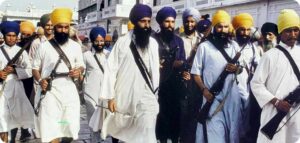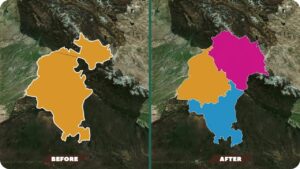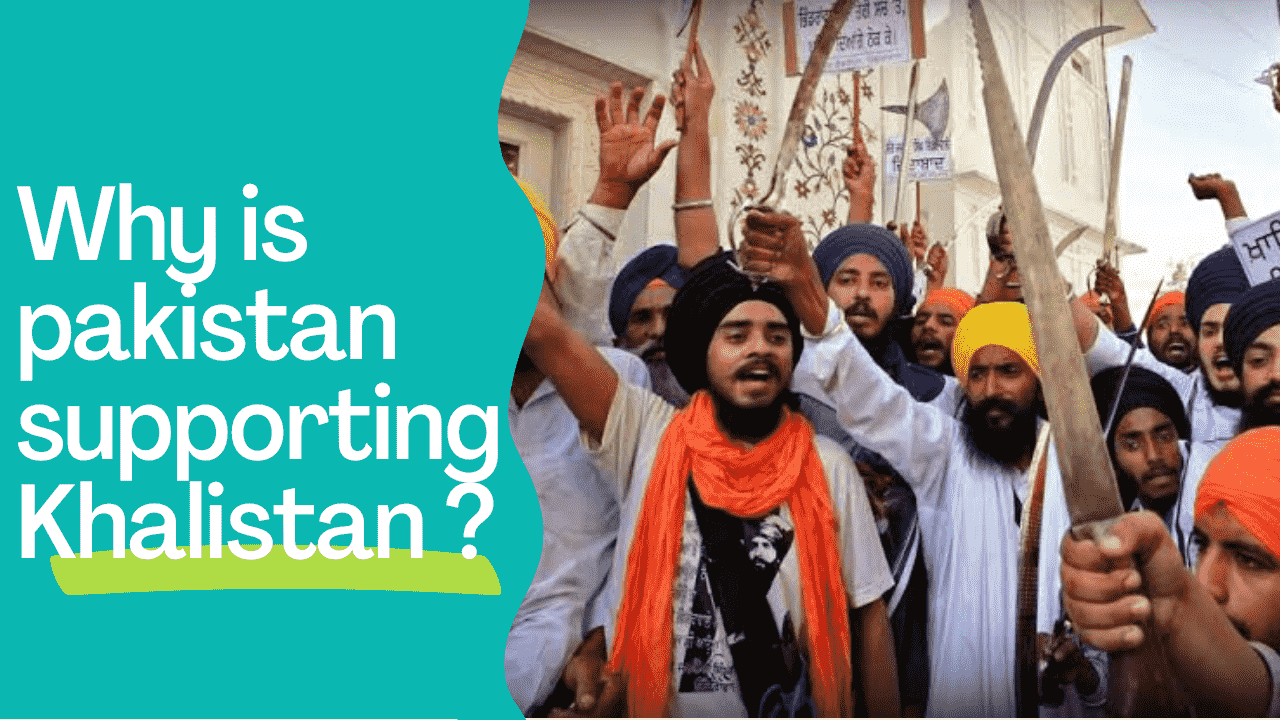Why some people are demanding a separate country for Sikhs
Khalistan, A word that can create a second partition in India. Some such developments have taken place in Punjab in the last few days. Due to which this dangerous person of 1998 has come back. What is Khalistan? Why some people are demanding a separate country for Sikhs. and Why is Pakistan supporting Khalistan?
What Happened?
Why are we writing this blog? Because something like this has been happening in Punjab in the last few weeks. Which reminds us of our dark past. This is Amritpal Singh. he would not have even heard his name for 6 months. But today this person is living there as a big leader in Punjab. Due to which people say “Bhindranwale 2.0.” Deep Sidhu had become quite a controversial figure after the farmers protest. He started a social organization named “Waris Punjab De“. Amritpal Singh became the head of this organization after the death of Deep Sidhu. Amritpal Singh calls himself a pro-Khalistan leader. It happened that one of his supporters, Lovepreet Singh, AKA Toofan, was arrested in a kidnapping case, and against this arrest, hundreds of his supporters entered the Anjala police station, and that too with swords. Amritpal Singh gave an ultimatum to the police itself. And to control the situation, the police negotiated with him and gave an assurance that they would release Amritpal Singh. Amritpal Singh has openly said that the same solution will be meted out to our home minister as it was to our prime minister, Indira Gandhi. This is quite a dangerous situation. And it reminds us of the dark past of Punjab.

Birth of Khalistan Idea
Many people think that the Khalistan Movement started in the 1980s. But the truth is that its seeds were sown by the British. He used the divide and rule policy not only to create rifts in Hindu-Muslim relations but also to separate Sikh people from Hindus. In 1857, the soldiers of the British Army, forgetting their defense as Indians, almost threw the Britishers out of India. Then the British came to know that it was necessary to keep the people of India separate on the basis of caste and religion. Earlier, the Indian people who knew themselves as India, with this one identity, were divided. On the basis of language, on the basis of religion So that they could not come together and fight for a cause.
Till 1914, 75% of the people in the British Army used to come only from this area. northwestern provinces, Punjab, and Nepal. This division being based on language kept creating a rate in his mind. That language will be dominant, and people speaking that language will get better representation. They will have more rights. How would independent India be in 1947? On what basis will the decisions be made? Many such questions were before us, and then the Punjabi Subah Movement demanded to create a Punjabi-speaking state. Earlier, whatever Punjab used to look like, it was divided into three parts in 1966. Himachal Pradesh and Haryana, where there was a Hindi-speaking Hindu majority, and Punjab, where there was a Punjabi-speaking Sikh majority But 1971 was quite an interesting year, when West Pakistan and East Pakistan separated and Bangladesh was formed. Bangladesh was Pakistan’s big humiliation at that time. Zulfikar Ali Bhutto became the President of Pakistan, and he took a vow that he would definitely take revenge on Bangladesh from India.

Bangladesh will be cut off from the land of India as well. This was not reported by me but by a Canadian journalist named Tarek Fatah himself. For the first time in 1971, the word Khalistan was used internationally. In an advertisement in “The New York Times“. Indian intelligence has reported that these ads were given by the Pakistan Embassy in Washington. But what is the logic behind this? Why is Khalistan strategically important for Pakistan? Khalistan is important for Pakistan because it acts as a buffer between Pakistan and India. The rivers coming into Pakistan pass through Punjab. So Pakistan feels that negotiating with Khalistan will be easier than negotiating with India. And it will be a victory for Pakistan because India also helped Bangladesh. Pakistan supports the Khalistan movement; it seems like this again and again. Because whenever you see the map of Khalistan, it never includes the Punjab on the Pakistani side.
Khalistan Movement and Violence
What was happening in India? Punjab was demanding a separate constitution. Before the involvement of Pakistan, in 1967, Akali Dal demanded special status for the Sikh people of Punjab, like Article 370 of Jammu and Kashmir. In 1973, he passed the Anand Sahib resolution. In which, along with many social and economic reforms, we learned that supremacy was also demanded. And only then a new leader emerged, Jarnail Singh Bhindranwale. He started radicalizing the youth of Punjab and started a civil disobedience movement called Dharma Yuddha Morcha. In the beginning of the day, he focused on demanding the Anandpur resolution. But going forward, his actions started becoming extreme. He promoted a militant and radical version of Sikhism and started the most violent period in Punjab. He started the Khalistan Liberation Forces. Kidnapping, killing, and bombing had become common in Punjab. There were many Sikh people who considered this Khalistan movement a crime. But this extremist did not leave.
In the 1980s, 22,000 people died due to this movement, including 12,000 civilians. Bhindranwale forcibly made the Golden Temple his base. And here all kinds of bones and bullets were hidden. On June 6th, 1984, our Prime Minister Indira Gandhi conducted Operation “Blue Start”. And this terrorist was killed. But many civilians also became casualties in this. Some experts believed that the total casualties were higher than 3000. Indira Gandhi was assassinated a few months later. And after this, anti-Sikh violence took place in North India. The official figure says that 3500 people were killed in this conflict. But independent research says that this number was around 8000 to 17000. In 2011, Human Rights Watch reported that India has still taken action against those who are responsible for these rights. There it is: during the years of turbulence, many Sikh people got displaced; many people left India and settled in other countries. And he was convinced that he would not get justice in India, and it was a big loss for India.
Today, there are many such people and organizations who are provoking people inside the country from outside. And in the name of support, they are trying to make Khalistan supporters. Its only objective is to revive the demand for Khalistan.
Today’s context
Now it has been 40 years since Jarnail Singh Bhindranwale passed away. The Khalistan movement also got cold. Why are we discussing it today? Because the truth is that some questions emerged in the 1970s. They are emerging even today. You must have heard this term, “Union of States,” in many speeches these days. Many intellectuals say that India is not a country but a union of states. They want to imply that both the state and the center should have a power divide. All the power should not be concentrated in the hands of the center. The way of reaching this point with the people cannot be wrong. Because many states get the same message from this that you are violators, India will never be able to give you your rights, so fight for it. Because in the 1970s, the Akali Dal had also talked about the same thing and demanded more autonomy for Punjab in the Anandpur Sahib resolution. History does not repeat itself, but main events do!
Today, it is a matter to think that a 29-year-old man is coming from Dubai. How does one suddenly become a Sikh leader? How did it suddenly get such a huge fan following? And how can the police not take any action against him? All these things are not possible without any support. Whatever the reality may be, India has a bad habit. Instead of solving any tough problem, we ignore it or delay it. Instead of cleaning it with the garbage that is in the country, they put it under the bed. Then years pass, and this garbage rots. The problem becomes bigger. And we citizens have to pay a heavy price for it. Punjab is a boarding state, which is very important for India. The people of Punjab are very important for India. The Sikh community is very important for India.
Today, we need cooperation in these states and centers. Here we need to make laws and order in Punjab, leaving useless blame games. Since 1999, the Punjab Police has done a great job establishing law and order in Punjab. As citizens of India, we need to understand that 99.9% of Sikhs do not support Khalistan. They consider themselves a part of India, and it is only a part of India that wants to destroy India. They only want anti-Sikh sentiment to spread because of the violence in Punjab. So that the Sikh people in the rest of the community are pushed away, they start speaking Khalistani, and then it is easy to radicalize them. We don’t have to let it be completely successful in its objective. We have to move forward, considering Sikhs and people of every religion, caste, and creed as an equal part of our country. It is the responsibility of the government to protect every human being. General Bipin Rawat sir told us that India has to be ready for a 2.5-front war. Where we will face danger not only from outside but also from inside. “They need to remember that ships do not sink because of water around them; ships sink because of water that gets into them“

2 thoughts on “Why is Pakistan supporting Khalistan?”